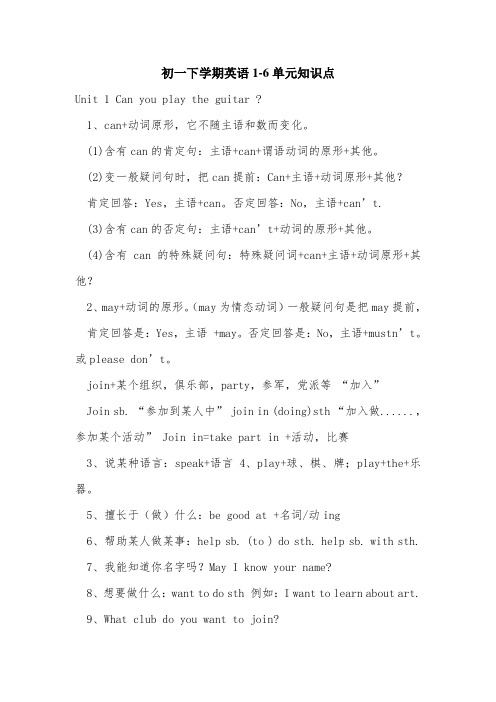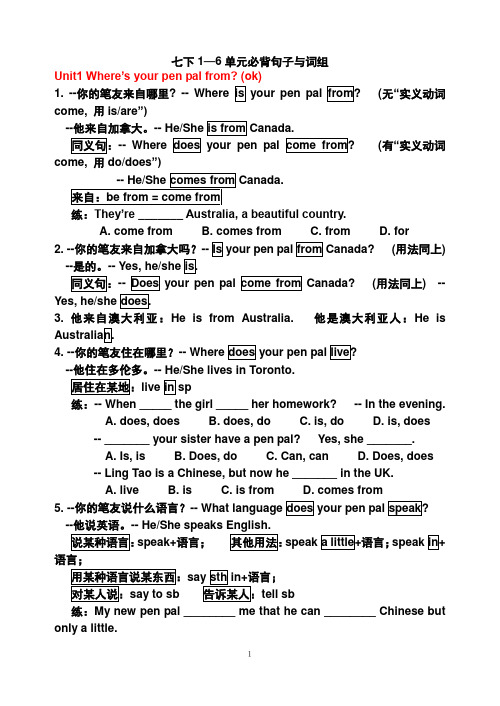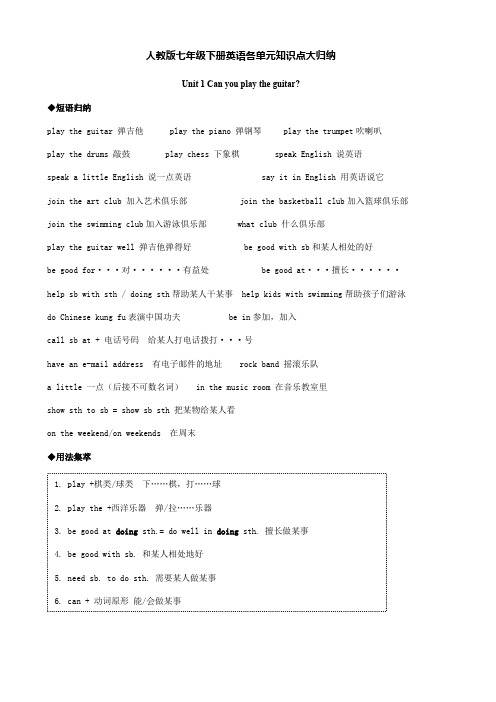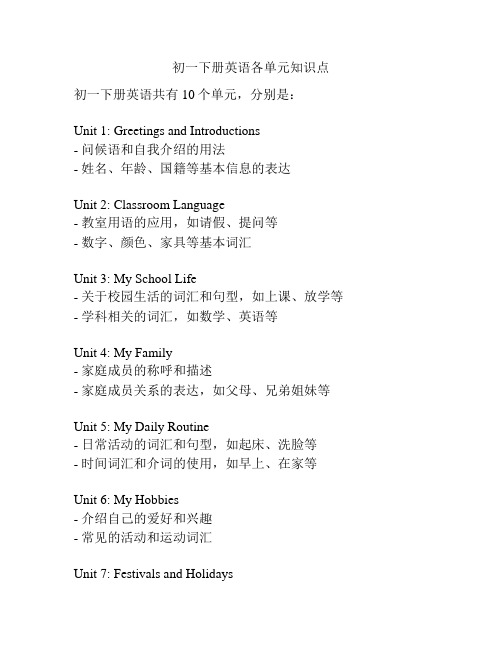英语初一下册1-6单元知识点
初一下学期英语1-6单元知识点.doc

初一下学期英语1-6单元知识点Unit 1 Can you play the guitar ?1、can+动词原形,它不随主语和数而变化。
(1)含有can的肯定句:主语+can+谓语动词的原形+其他。
(2)变一般疑问句时,把can提前:Can+主语+动词原形+其他?肯定回答:Yes,主语+can。
否定回答:No,主语+can’t.(3)含有can的否定句:主语+can’t+动词的原形+其他。
(4)含有can的特殊疑问句:特殊疑问词+can+主语+动词原形+其他?2、may+动词的原形。
(may为情态动词)一般疑问句是把may提前,肯定回答是:Yes,主语 +may。
否定回答是:No,主语+mustn’t。
或please don’t。
join+某个组织,俱乐部,party,参军,党派等“加入”Join sb. “参加到某人中” join in (doing)sth “加入做......,参加某个活动” Join in=take part in +活动,比赛3、说某种语言:speak+语言4、play+球、棋、牌;play+the+乐器。
5、擅长于(做)什么:be good at +名词/动ing6、帮助某人做某事:help sb. (to ) do sth. help sb. with sth.7、我能知道你名字吗?May I know your name?8、想要做什么:want to do sth 例如:I want to learn about art.9、What club do you want to join?I want to join the chess club and the basketball club.10、What club does Tom want to join? He wants to join the swimming club .11、He can’t play the violin or the piano. Can you help kids with swimming?12、Why do you want to join the English club? Because I want to learn English well.Unit 2 What time do you go to school ?1、what time和when引导的特殊疑问句。
科教版英语七年级下册个个单元知识点

【科教版英语七年级下册个个单元知识点】1. Unit 1: My Day- 常用动词短语:get up, have breakfast, go to school, have lunch, go home, do homework, go to bed- 时间表达:in the morning, in the afternoon, in the evening- 询问日常活动:What time do you get up? What time do you go to bed?- 日常活动的描述:I get up at 7 o'clock. I have breakfast at 7:30. I go to school at 8:00.- 词汇:alarm clock, brush teeth, take a shower, dress, bus, classroom, library, bedroom, kitchen2. Unit 2: My School Day- 学科名词:Chinese, Math, English, Science, History, Geography - 学校地点词汇:classroom, library, playground, canteen, office, gym, lab,puter room- 学校活动描述:We have Chinese in the morning. We have Math in the afternoon.- 学校用语:What's your favorite subject? My favorite subject is English.- 词汇:homework, exam, teacher, classmates, principal, school uniform, pencil case3. Unit 3: My Family- 家庭成员称呼:father, mother, parents, brother, sister, grandparents- 家庭活动描述:I have dinner with my family. We go to the park on weekends.- 家庭成员的描述:My father is tall. My mother is kind.- 家庭用语:How many people in your family? I have one brother and one sister.- 词汇:family, home, house, living room, bedroom, kitchen, dining room, bathroom4. Unit 4: My Country- 国家名称:China, America, Canada, Australia, Japan, England - 国旗、国歌、首都等国家元素的描述- 国家人口、面积等相关数据的询问与回答- 国家风俗习惯、传统节日等相关介绍- 词汇:flag, anthem, capital, population, area, culture, tradition, festival5. Unit 5: My Free Time- 体育运动:play basketball, play football, swim, run, ride a bike - 旅游活动:go hiking, go camping, go fishing, go swimming- 休闲娱乐:watch TV, listen to music, play video games, read books- 兴趣爱好描述:I like playing basketball. I enjoy watching movies.- 词汇:sports, hobby, interest, activity, park, theater, museum6. Unit 6: The Weather- 天气状况描述:It's sunny today. It's r本人ny tomorrow.- 季节描述:In spring, the weather is warm. In winter, the weather is cold.- 天气对活动的影响:We can go swimming when it's hot. We can't go out when it's stormy.- 天气预测用语:What's the weather like tomorrow? It will be cloudy.- 词汇:weather, temperature, season, sunny, r本人ny, snowy, windy7. Unit 7: My Travel Plan- 交通方式描述:I will take the tr本人n to Beijing. I will fly to New York.- 目的地活动描述:I will visit the Great Wall. I will go shopping on Fifth Avenue.- 行程安排:We will stay in a hotel for three days. We will visitthe museum in the morning.- 旅行用语:Where are you going? How long will you stay there? - 词汇:transportation, destination, attraction, hotel, 本人rport, tr本人n station8. Unit 8: My Plans- 将来计划描述:I will study harder next year. I will travel around the world when I grow up.- 将来活动安排:We will have a party on Saturday. We will go to the beach next month.- 个人抱负描述:I want to be a doctor. I hope to be a successful businessman.- 愿望与期望:I wish to have a happy family. I hope to make more friends.- 词汇:plan, future, ambition, wish, hope, dream9. Unit 9: My Dream School- 学校设施描述:There is a big playground in our dream school. There are manyputers in theputer room.- 学校环境描述:Our dream school is beautiful and clean. There are flowers everywhere.- 学校规章制度:We have to wear school uniforms every day. We can't bring phones to school.- 学校生活愿景:I hope my dream school has great teachers and friendly classmates.- 词汇:school, facility, environment, regulation, vision10. Unit 10: My Health- 保持健康的方法:eat healthy food, do exercise, get enough sleep, drink more water- 常见健康问题:headache, stomachache, fever, cough, cold- 就医就诊描述:I have to see a doctor. I need to take some medicine.- 健康用语:How do you keep healthy? I have a sore throat.- 词汇:health, exercise, diet, symptom, medicine, hospital以上是科教版英语七年级下册各个单元的知识点介绍,希望对您有所帮助。
人教版新目标_go_for_it!七年级下册_英语__1-12单元知识点

七下1—6单元必背句子与词组Unit1 Where’s your pen pal from? (ok)1. --你的笔友来自哪里? --your pen(无―实义动词come, 用is/are‖) --他来自加拿大。
-- Whereyour pen pal(有―实义动词come, 用do/does‖)练:They’re _______ Australia, a beautiful country.A. come fromB. comes fromC. fromD. for2. --你的笔友来自加拿大吗?(用法同上) --是的。
your pen Canada? (用法同上)--3. 他来自澳大利亚:He is fromAustralia. 他是澳大利亚人:He is4. --你的笔友住在哪里?--他住在多伦多。
-- He/She lives in Toronto.练:-- When _____ the girl _____ her homework? -- In the evening.A. does, doesB. does, doC. is, doD. is, does-- _______ your sister have a pen pal? Yes, she _______.A. Is, isB. Does, doC. Can, canD. Does, does-- Ling Tao is a Chinese, but now he _______ in the UK.A. liveB. isC. is fromD. comes from5. --你的笔友说什么语言?--他说英语。
-- He/She speaks English.speak+语言;语言;语言;tell sb练:My new pen pal ________ me that he can ________ Chinese but only a little.12I can’t ________ French, but I can ________ it in English.6. 我喜欢和我的朋友一起去看电影:I liketo the moviesmy friends.①②③7.write e-mailsto each other8. 9. 告诉我关于你自己: 讲故事给某人听:10.11.相似单词比较:(1) 信:letter 一点:little (2) 法国:France 法语:French12. (1) like v. 喜欢; 如:(2) like prep. 像; 如:13. (1) country n. 国家; (2) country n.14. (1) from perp. 来自; 如:(2) from prep. 从; 如:Unit2 Where’s the post office? (ok)1. 问路:(1) Excuse me, how can I get to the post office?(2) Excuse me, can you tell me the way to the post office?2. --这儿附近有一个邮局吗?--是的。
英语人教版七年级下册1-6单元作文背诵

2.Hehasbreakfast at 7:40.Heoftenhasnoodlesandaneggfor breakfast.He thinks having a good
breakfast is veryimportant for his health.
How do I get to school?Oh,I walk to school every day.I like walking and it’s a good way to keep healthy.
Ending:How do you t to school?Tell me soon.
你学到了什么句式?
第一部分写作要点人教版七B Unit1作文自我推荐话题
假设你是13岁的Jason,你想去儿童福利院做志愿者,给福利院院长写一封信,介绍一下自己。
Name
Jason
My name is Jason.
Age
13
I’m 13 years old.
Job
红星中学七年级1班的一名初中学生
I’m a middle school student from Hongxing Middle
classmates.He loves sports very much.
7.He gets home at 17:30.When he gets home ,he does his homework first.
8.At 18:30,he eats dinner with his parents.Then,he either takes a walk with them or plays chess
人教版七年级下册英语各单元知识点总结归纳

人教版七年级下册英语各单元知识点大归纳Unit 1 Can you play the guitar?◆短语归纳play the guitar 弹吉他 play the piano 弹钢琴 play the trumpet吹喇叭play the drums 敲鼓 play chess 下象棋 speak English 说英语speak a little English 说一点英语 say it in English 用英语说它join the art club 加入艺术俱乐部 join the basketball club加入篮球俱乐部join the swimming club加入游泳俱乐部 what club 什么俱乐部play the guitar well 弹吉他弹得好 be good with sb和某人相处的好be good for···对······有益处be good at···擅长······help sb with sth / doing sth帮助某人干某事 help kids with swimming帮助孩子们游泳do Chinese kung fu表演中国功夫 be in参加,加入call sb at + 电话号码给某人打电话拨打···号have an e-mail address 有电子邮件的地址 rock band 摇滚乐队a little 一点(后接不可数名词) in the music room 在音乐教室里show sth to sb = show sb sth 把某物给某人看on the weekend/on weekends 在周末◆用法集萃1. play +棋类/球类下……棋,打……球2. play the +西洋乐器弹/拉……乐器3. be good at doing sth.= do well in doing sth. 擅长做某事4. be good with sb. 和某人相处地好5. need sb. to do sth. 需要某人做某事6. can + 动词原形能/会做某事◆语法can 能;会;可以【用法】它本身有一定的含义,没有人称和数的变化,但不能单独作谓语,要和动词原形一起构成谓语。
初一下册英语各单元知识点

初一下册英语各单元知识点初一下册英语共有10个单元,分别是:
Unit 1: Greetings and Introductions
- 问候语和自我介绍的用法
- 姓名、年龄、国籍等基本信息的表达
Unit 2: Classroom Language
- 教室用语的应用,如请假、提问等
- 数字、颜色、家具等基本词汇
Unit 3: My School Life
- 关于校园生活的词汇和句型,如上课、放学等- 学科相关的词汇,如数学、英语等
Unit 4: My Family
- 家庭成员的称呼和描述
- 家庭成员关系的表达,如父母、兄弟姐妹等
Unit 5: My Daily Routine
- 日常活动的词汇和句型,如起床、洗脸等
- 时间词汇和介词的使用,如早上、在家等
Unit 6: My Hobbies
- 介绍自己的爱好和兴趣
- 常见的活动和运动词汇
Unit 7: Festivals and Holidays
- 介绍常见的节日和假期
- 相关的庆祝活动和特色食物等
Unit 8: My City
- 城市相关的地理和建筑物词汇- 指示方向和交通方式的表达
Unit 9: At the Restaurant
- 在餐厅用餐的基本用语和礼仪- 常见的食物和饮料词汇
Unit 10: Shopping
- 购物场景下的问询和购买方式- 常见商品和货币的表达。
七年级下册英语1~6单元知识点
七年级下册英语1~6单元的知识点:Unit 1: Making FriendsGreetings and introductions (e.g. Hello! My name is…)Asking and answering personal questions (e.g. How old are you? Where are you from?)Describing people’s physical appearance and personality traits (e.g. She has long hair and she is friendly.)Unit 2: My School LifeSchool subjects and daily routines (e.g. I have English, Math, and Science classes. I wake up at 6:30 every morning.)Classroom instructions and basic vocabulary related to school supplies (e.g. Open your books. Turn to page 20. Pencil, eraser, notebook)Unit 3: My FamilyVocabulary related to family members (e.g. father, mother, brother, sister)Expressing family relationships (e.g. My grandfather is my mother’s father.)Talking about daily activities and responsibilities within the family (e.g. I help my parents with household chores.)Unit 4: Hobbies and InterestsVocabulary related to various hobbies and activities (e.g. playing sports, reading, dancing)Expressing likes and dislikes (e.g. I like playing video games. I don’t like watching TV.)Talking about frequency and intensity of activities (e.g. I often go swimming on weekends. I sometimes play basketball.)Unit 5: Food and HealthVocabulary related to food and drinks (e.g. fruits, vegetables, water, milk)Talking about healthy habits and routines (e.g. I eat fruits and vegetables every day. I exercise for 30 minutes three times a week.)Expressing preferences and making food choices (e.g. I prefer pizza over hamburgers. I want to order a salad.)Unit 6: Movies and MusicVocabulary related to movies and music genres (e.g. action, comedy, pop, rock)Talking about preferences and opinions on movies and music (e.g. I love action movies. I think rock music is exciting.)Describing experiences and events related to movies and music (e.g. I went to a concert last weekend. The movie was really funny!)。
期末复习人教版英语七年级下册单元重点知识点语法汇总
人教版七年级下册-单元重点语法汇总U1情态动词can的用法can是情态动词,意为“能,会”,表示某人或某物具备的能力,还可用来提出请求,没有人称和数的变化,后面直接接动词原形。
下面学习情态动词can的常见用法。
1.表示“能力”,意为“能,会”。
例句:I can speak English.我会讲英语。
2.表示“请求”或“许可”。
例句:Can you help me with my Chinese?你能帮我学汉语吗?You can go to the park after you finish your homework.你做完作业后可以去公园。
3.含有情态动词can的肯定句变否定句时,需在can后加not,其缩写形式为can’t;变疑问句时,情态动词can直接放在句首,构成一般疑问句。
例句:I can sing English songs.我会唱英文歌。
(肯定句)→I can’t sing English songs.我不会唱英文歌。
(否定句)Yao Ming can play basketball.姚明会打篮球。
→Can Yao Ming play basketball?姚明会打篮球吗?(一般疑问句)4.对Can…问句的回答可以用下面几种形式:对询问能力的问句的回答可以说“Yes,…can.”或“No,…can’t.”,表示对能力的肯定或否定;对表示请求的问句的回答可以说“OK./All right.”,表示同意对方的请求。
也可用certainly或sorry来回答。
用certainly作肯定回答,语气更肯定;用sorry作否定回答,语气则更委婉、客气。
例句:—Can you speak English?你会说英语吗?—Yes,I can.是的,我会。
—Can I see your pencil-box,please?请问,我可以看一下你的铅笔盒吗?—All right./Certainly.Here you are.可以。
七年级下册英语单元知识点总结道客
七年级下册英语单元知识点总结道客道客七年级下册英语单元知识点总结七年级下册英语单元知识点总结英语学习是我们初中学习的重要一环,对于初中七年级下册英语单元知识点的掌握,不仅能够帮助我们更好地理解课文,还能够提高我们的英语语言能力。
下面是对七年级下册英语单元知识点的总结,希望对同学们的学习有所帮助。
Unit 1: Greetings and Introductions这个单元主要是学习问候和介绍的表达方式。
学习如何问候他人,如何介绍自己和他人的基本信息。
同时,还学习了一些关于国家和国籍的词汇。
Unit 2: School Life这个单元主要是学习关于学校生活的表达方式。
学习如何表达自己的课程安排,学习如何询问他人的学习情况。
同时,还学习了一些学校设施和学习用品的词汇。
Unit 3: Hobbies这个单元主要是学习关于爱好的表达方式。
学习如何表达自己的爱好,学习如何询问他人的爱好。
同时,还学习了一些关于运动、音乐和艺术的词汇。
Unit 4: Family and Friends这个单元主要是学习关于家庭和朋友的表达方式。
学习如何介绍自己的家庭和朋友,学习如何询问他人的家庭和朋友。
同时,还学习了一些家庭成员和人际关系的词汇。
Unit 5: Food and Drinks这个单元主要是学习关于食物和饮料的表达方式。
学习如何点餐和询问他人的饮食习惯。
同时,还学习了一些关于食物和饮料的词汇。
Unit 6: Health and Body这个单元主要是学习关于健康和身体的表达方式。
学习如何描述自己和他人的健康状况,学习如何询问他人的健康状况。
同时,还学习了一些关于身体部位和常见疾病的词汇。
Unit 7: Clothes and Weather这个单元主要是学习关于服装和天气的表达方式。
学习如何描述自己和他人的服装,学习如何询问他人的服装和天气情况。
同时,还学习了一些关于服装和天气的词汇。
Unit 8: Shopping这个单元主要是学习关于购物的表达方式。
人教版七年级英语下册单元知识点总结(全册)
人教版七年级英语下册单元知识点总结(全册)Unit 1 Can you play the guitar?一短语归纳1.speak English/Chinese 说英语/汉语2. what club /sports什么俱乐部/运动3.play the guitar/ piano/drums/ violin 弹吉它/弹钢琴/敲鼓/拉小提琴4. play chess/ basketball/ volleyball/ soccer 下国际象棋/ 打篮球/排球/足球5.tell stories讲故6. the art/chess/swimming/sports/ story telling/English club艺术/国际象棋/游泳/体育/讲故事/英语俱乐部7.school show 学校演出8.sound good听起来不错9.teach music 教音乐10.do kung fu练(中国) 功夫11.make friends(with sb.)(结交朋友)12.on the weekend/on weekends在周末e and show us来给我们表演15.write stories写故事16.after school放学后17.English-speaking students说英语的学生18.play games 做游戏19.the Students’ Sports Center学生运动中心20.at the old people’s home在老人之家21.be in our school music festival 参加学校音乐节22.jion the music club加入音乐俱乐部二用法集萃1. play +棋类/球类下……棋,打……球2. play the +乐器弹/拉……乐器3. be good at doing sth.擅长做某事be good for.. 对… 有好处be good /kind to … 对… 友好4. be good with sb. 和某人相处地好; 善于应付(处理)…5. need(sb./sth.)to do… 需要(某人/某物)做….6. can + 动词原形能/会做某事7. a little + 不可数名词: 一点儿……9. like to do sth.或like doing sth. 喜欢做某事10.want to do…想做……11.What about…?…怎么样?(后面接Ving/代词/名词)12. talk用法: talk to/with sb. 跟某人说话talk about sth. 谈论某事tell 用法:tell sb sth. 告诉某人某事tell sb to do sth 告诉某人去做某事tell stories 讲故事say用法:say直接加说话的内容/itspeak用法:speak +语言13.help sb. with sth在某方面帮助某人= help sb.(to)do sth14.be free /busy有空/很忙15. call sb. at+号码拨打某人的……号码16. be in=join …成为…中的一员(P6)17.want …for the school show为学校表演招聘……三典句必背1. Can you draw? 你会画画吗?Yes, I can. / No, I can’t.是,我会。
- 1、下载文档前请自行甄别文档内容的完整性,平台不提供额外的编辑、内容补充、找答案等附加服务。
- 2、"仅部分预览"的文档,不可在线预览部分如存在完整性等问题,可反馈申请退款(可完整预览的文档不适用该条件!)。
- 3、如文档侵犯您的权益,请联系客服反馈,我们会尽快为您处理(人工客服工作时间:9:00-18:30)。
英语初一下册1-6单元知识点
Unit 1 Can you play the guitar ?
1、can+动词原形,它不随主语和数而变化。
(1)含有can的肯定句:主语+can+谓语动词的原形+其他。
(2)变一般疑问句时,把can提前:Can+主语+动词原形+其他?
肯定回答:Yes,主语+can。
否定回答:No,主语+can't.
(3)含有can的否定句:主语+can't+动词的原形+其他。
(4)含有can的特殊疑问句:特殊疑问词+can+主语+动词原形+其他?
2、may+动词的原形。
(may为情态动词)一般疑问句是把may提前,
肯定回答是:Yes,主语 +may。
否定回答是:No,主语+mustn't。
或please don't。
join+某个组织,俱乐部,party,参军,党派等“加入”
Join sb. “参加到某人中” join in (doing)sth “加入做......,参加某个活动” Join in=take part in +活动,比赛
3、说某种语言:speak+语言
4、play+球、棋、牌;play+the+乐器。
5、擅长于(做)什么:be good at +名词/动ing
6、协助某人做某事:help sb. (to ) do sth. help sb. with sth.
7、我能知道你名字吗?May I know your name?
8、想要做什么:want to do sth 例如:I want to learn about art.
9、What club do you want to join?
I want to join the chess club and the basketball club.
10、What club does Tom want to join? He wants to join the swimming club .
11、He can’t play the violin or the piano. Can you help kids with swimming?
12、Why do you want to join the English club? Because I want to learn English well.
Unit 2 What time do you go to school ?
1、what time和when引导的特殊疑问句。
(1)对时间提问用what time,也能够用when。
询问钟点时用what time,询问日期、月份、年份时用when。
(2)询问做某事的时间时,两者能够互换。
(3)其他询问时间的句子:
What's the time? =What time is it?现在几点了?
时刻表达法:顺读法和逆读法。
(1)顺读法:“钟点+分钟”直接读数字。
(2)逆读法:借助介词past或to表示,要先说分再说钟点。
A.当分钟不超过30分钟时(包括30分钟),即30,用to表示。
其结构为:“所差分钟(即60—所
过度钟数)+to+下一个整点”,to译成“差”,差几分钟到几点。
C.当分钟为30分钟用half表示,当分钟为15分钟用a quarter。
2、always 总是>usually 通常>often常常>sometime 有时
3、Watch+TV、球赛“观看,观赏”,特指长时间注视。
See+电影、医生“看见”,强调看的结果。
Look “看”,强调看的动作,look后接宾语时要用介词at。
Read+书刊、杂志“阅读”
4、listen to +宾语 6、Take a shower “淋浴” 7、Eat breakfast 吃早餐
5、Go to +地点名词如:go to school go+地点副词如:go home
Unit 3 How do you get to school?
一、本单元知识点总结
1.get to school 到校
2.take the subway 乘地铁
3.take the train 坐火车
4.leave for 到……地方去,离开去
某地
5.take…to…把……带到……
6. most students 绝大部分学生
7. from…to…从……到…… 8.think of 想到,想起
9.ride bikes 骑自行车 10.in other parts of the world 在世
界的其他地方
11. how far 多远 (路程、距离) 12.how long多长(时间)
13.take the train to school 乘火车去上学 14.in places 在
一些地方。
